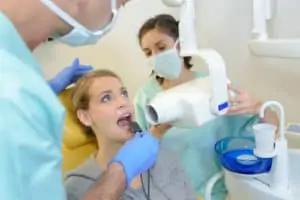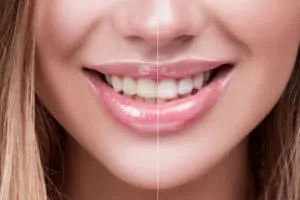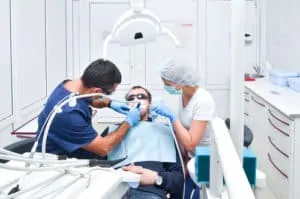Oral Health

What Are Dental X-Rays?
Just like an x-ray of your arm or leg, dental x-rays take images that show the hard surfaces in your mouth. The energy of x-rays passes through the skin and highlights only dense areas such as teeth and bone. The skeletal-like images produced from x-rays give your dentist in Sparks an inside look at your oral health and can help identify problems that can’t be seen through a visual or manual dental exam alone.
What Do Dental X-Rays Show?
We already know that dental x-rays show the teeth and bone, but what does your dentist look for on x-rays? The truth is, x-ray images can identify several things that could otherwise be missed and progress into more serious problems.
- Decay
Dental x-rays are most commonly used to help diagnose decay and cavities when they’re still small and easier to treat. You may not yet even have any signs of a cavity, but a quick x-ray can show one developing. X-rays can also catch decay that can develop under a previous dental restoration such as a crown or a filling. Finding and treating these areas of decay early can save you from ever experiencing the pain that could result if left alone.
- Abscess
When a patient has a toothache, their dentist in Sparks will most likely start by taking a few x-rays to get a closer look at the area. Oftentimes, a toothache can be a sign of an infection, also known as an abscess. To treat an abscess, your dentist will most likely remove the infected area of the tooth and may choose to cap it with a dental crown. Severe cases may even require an extraction.
- Bone Loss
Our teeth are typically strongly secured into our jaw bone. But things like gum disease, missing teeth, and osteoporosis can cause the jaw bone to deteriorate. This bone loss can increase the risk of tooth loss, cause headaches and jaw pain, and can even affect the appearance of the face making it appear wrinkly or saggy.
Are Dental X-Rays Safe?
We understand that there may be some concerns surrounding the use of dental x-rays and exposure to radiation. However, advancements in dental technology have made digital dental x-rays one of the lowest forms of radiation emission. In fact, research conducted by the Kois Center for Dental Education shows that four bitewing x-rays emit only 0.005 mSv (millisieverts) of radiation. This is less than what humans are exposed to naturally every day.
Even though you may not get dental x-rays at every appointment, you should get them when they are recommended. They will help your dentist provide personalized care, catch and treat problems early, and help you maintain a healthy smile.
Each and every February, loved ones throughout the United States go above and beyond preparing for Valentine’s Day. Whether you choose to show your love with chocolates or flowers, one thing remains constant — bright red hearts are everywhere we look. But there’s another reason (besides Valentine’s Day) that we should pay attention to these hearts. February is American Heart Health Month and focuses on raising awareness of how daily choices affect our risk of heart disease. In fact, this holiday has a special place in your Sparks dentist’s heart because there is a strong connection between oral health and heart health.
What is Gum Disease?
Gum disease is an infection in the gum tissues usually caused by a buildup of bacteria and plaque. When someone doesn’t brush their teeth often enough or well enough, plaque is left behind and can easily work its way up under the gum, settle in, and cause trouble.
There are four stages of gum disease including:
- Gingivitis
- Slight Periodontal Disease
- Moderate Periodontal Disease
- Advanced Periodontal Disease
Gum disease can be treated if caught in the gingivitis stage, so make sure you visit your dentist in Sparks every six months for dental cleanings, x-rays, and thorough exams so we can identify any problems early.
What Does This Have to Do With Your Heart?
If gingivitis isn’t diagnosed and treated quickly it will progress into slight, moderate, or advanced periodontal disease, all of which are irreversible. When gum disease progresses into these advanced stages, the infection can enter the bloodstream and travel throughout the body. This can affect areas outside of the mouth, including the heart.
Heart Disease
Bacteria from gum disease in the bloodstream causes the body to produce too much C-reactive protein (CRP). Higher than normal levels of CRP can lead to serious conditions such as:
- Inflamed arteries
- Blood clots
- Heart attacks
- Strokes
Knowing that your oral health can have such an impact on your overall wellness makes it so incredibly important that you practice good oral hygiene habits at home, including brushing twice a day for two minutes and flossing every day.
Signs of Gum Disease
Since early diagnosis is so crucial to treating gum disease before it has the chance to affect the rest of your body, you need to know the signs of gum disease. Keep an eye out for:
- Bleeding when brushing or flossing
- Puffy, tender gums
- Bad breath
- Loose teeth
If you notice any of the signs of gum disease, call your dentist in Sparks to schedule an appointment. This American Heart Health Month, commit to reducing your chances of heart disease by brushing and flossing every day, seeing your dentist in Sparks twice a year, exercise, and eat a healthy diet. For more ideas on how to live a heart-healthy life, visit the National Heart, Lung, and Blood Institute.

Avoid Using Teeth To Open Packages
We’ve all been there — hungry for lunch with a delicious bag of chips waiting for us. We go to open it and it’s just… stuck. We pull and pull but we just can’t get the bag to open. So instead, we grab the bag between our teeth, bite down, and rip. Finally! Crunchy, crispy chips. While this tactic can successfully open packages, it can also cause tooth damage. When you encounter pesky packaging, tough tape, or tricky tags take a few extra minutes to find a pair of scissors and save yourself a potential trip to your dentist in Sparks.
Don’t Use Teeth To Help Carry Things
Another common way we tend to use our teeth as tools is to try and have them function as another hand to help us carry or hold things. However, our teeth aren’t meant to grip and hold on to things like nails, pencils, or even your cell phone. Doing so can also increase the risk of breaking or cracking teeth as well as put you at risk for choking.
Keep Things Out of Your Mouth
Anything that’s not food shouldn’t go anywhere near your mouth. This includes things like fingernails, pens, and jewelry. Chewing on non-food items can damage your teeth and your jaw and require treatment from your dentist in Sparks. Besides, a lot of these things can contain a lot of germs so the last place you should put them is in your mouth.
Take It Easy On The Nuts
Nuts are a great, nutritious snack that is packed with protein. They’re also pretty convenient and can travel easily. However, nuts have shells, and if you buy unshelled nuts, you’ll have to remove the casing to get to the edible inside. The most common way to do this is to crack the shell between teeth. This can once again lead to chips, cracks, or broken teeth. Other food items that can also damage your teeth in a similar way are popcorn, pumpkin seeds, and sunflower seeds.
Our teeth are incredibly tough and the protective enamel is actually the strongest substance in the human body. However, as with everything, teeth do have their limits to what they can withstand. To help protect your teeth, use them only to chew your food and avoid using them as any sort of tool. And of course, make sure to see your dentist in Sparks every six months for preventive dental checkups.

Oral Health is Linked to Overall Health
If your goal for this year is to get healthier overall, you can’t ignore your oral health. After all, our oral health is directly linked to our overall health and one can certainly affect the other. So as you commit to getting your 10,000 steps a day or eating healthier, make sure you also consider the following.
- Drinking Water
We often hear about patients wanting to cut back on sugary soda in the new year and drink more water. This is one of the best things you can do for both your whole body and your mouth. Water allows our bodies to function properly and keeps the mouth hydrated and moist which can help fight off cavity-causing bacteria. Aim to drink at least eight 8-ounce glasses of water every day.
- Quitting Smoking
Another popular, yet difficult, resolution year after year is to quit smoking. This can be an intimidating endeavor but with a good plan and a solid support system, we believe anyone can stop smoking. There are countless overall and oral health benefits to quitting including reducing the risk of cancer and lowering the likelihood of gum disease.
- Practicing Good Oral Hygiene
Everyone knows that your dentist in Sparks wants everyone to brush and floss every day, but we also know that this simple task can get overlooked and go undone. However, brushing and flossing your teeth each and every day is the best way to prevent dental problems from popping up. Make sure you brush twice a day and floss at least once a day to protect your pearly whites from cavities, gum disease, bad breath, and other problems.
- Keeping Your Dental Appointments
We always recommend that patients see us for professional dental cleanings and checkups twice a year, and sometimes more often. These bi-annual appointments are crucial to maintaining a healthy and mouth as well as a healthy body. They allow your dentist in Sparks to find any potential problems early and treat them quickly before they become big problems.
Make a promise to yourself that you will commit and follow through with your 2021 resolutions. And if you’re serious about getting healthier, schedule an appointment with your dentist today.

The Truth About Smile Whitening Treatments
Smile whitening is probably the most popular form of cosmetic dentistry done today. However, what was once only available at the dentist can now be done at home without any exam or assurance that the teeth are healthy enough. Additionally, even though over-the-counter whitening treatments can make it easier for people to whiten their teeth, it’s become increasingly popular and has created almost a whitening addiction. Both of which can cause some serious problems.
More Whitening, More Problems
Now, we should note that smile whitening can be done safely. However, there are issues when someone whose teeth aren’t healthy, or who thinks “the more whitening, the better” whitens their teeth that can cause things to take a turn for the worse.
Over-bleaching your teeth can wear down tooth enamel. Without this protective layer, teeth are put at increased risk for decay, cavities, and sensitivity. Additionally, if your teeth aren’t healthy to begin with, and let’s say you have a cavity, introducing bleaching ingredients can cause uncomfortable zings of pain through your teeth. And the problems don’t end there.
Many over-the-counter whitening treatments allow too much of the bleach to touch and sit on the gums which can cause gum irritation, sometimes severe. Lastly, too much whitening can actually make your teeth appear more translucent and darker in appearance, which is the opposite of what you want.
Safely Whiten Your Smile
The best way to get a whiter smile is to first start by talking to your dentist in Sparks. Not only can they help you find the best smile whitening treatment for you, but they can also help you find the best shade of white for your teeth for an overall natural, yet enhanced, look. Whichever smile whitening treatment you agree on, make sure you follow the directions to a “T,” especially if you’re going to use a take-home whitening product. Don’t leave the whitening gel on longer than recommended, and stop use if irritation or sensitivity occurs.
Even though smile whitening treatments can be found at any grocery store or even ordered online… it doesn’t mean that all of them are created equally. Make sure you do your own research, talk with your dentist in Sparks, and don’t overdo it.

Germs & Bacteria
We all know that germs can be passed from one person to another through kissing, but they aren’t the only things being swapped. When it comes to kissing, your dentist in Sparks is also concerned with the sharing of bacteria. You see, certain types of bacteria have been known to increase the risk of tooth decay and cavities. Now, while our mouths are naturally packed with bacteria, when we kiss, these bacteria (both good and bad) can easily transfer from person to person and introduce cavity-causing bacteria.
Keep Your Bacteria to Yourself
Even though kissing comes with some potential negatives, we’re certainly not recommending that you stop altogether. Instead, your dentist in Sparks has a few tips you can try in order to keep both you and your partner smooching safely.
- Breath Test
Nobody wants to kiss someone who has bad breath, and now we’re going to give you yet another reason to tread carefully when you encounter someone with chronically bad breath. Bad breath may be a sign of gum disease, which itself is caused by an overload of bacteria and an infection in the gum tissue.
- Oral Hygiene
Even though our mouths naturally contain tons of bacteria, you should always brush and floss regularly in order to keep bacteria levels in check. Also, it’s key that you see your dentist in Sparks at least every six months for professional cleanings to further protect your teeth.
- Drink Water
When you’re not able to brush your teeth try to drink or even rinse your mouth with water. This can also help remove bacteria buildup. You can also chew Xylitol gum to help reduce bacteria levels and give your breath a fresh boost for all those kissable moments. Plus, Xylitol can keep bacteria from sticking to your teeth and creates a neutral pH level in your mouth for even more protection.
Some Good News
It’s important to note that there are certainly some positives to kissing, some of which we mentioned earlier. As it relates to your oral health, kissing can actually help good bacteria move from person to person and increases your saliva production. Saliva is your mouth’s natural way of washing away bacteria and neutralizing acid, both of which help protect your teeth against decay.
When it comes to kissing, there are more positives than negatives. Just make sure you practice good oral hygiene habits so your breath is kissable fresh every single time you pucker up.

What is Plaque?
When trying to remember the difference between plaque and tartar, it may help to think of the two Ps. Plaque is the primary, or first, thing that can affect your teeth. Plaque is a sticky film that’s basically made up of millions and millions of bacteria. It naturally builds up on teeth throughout each day, and as we eat, the plaque bacteria are also eating. As a byproduct of this feeding, the bacteria release acids. These acids can erode tooth enamel, weaken teeth, and make it easier for cavities to form. However, when we effectively remove plaque through brushing, we can help reduce the number of bacteria and lower the risk of decay and the need for fillings from your Sparks dentist.
What is Tartar?
So what happens when plaque remains on the teeth for too long? That’s where tartar comes into play. When plaque isn’t effectively removed it will harden into tartar. Now, while plaque can be cleaned away through at-home brushing, tartar is a different story. Once plaque hardens into tartar it can’t be removed through regular brushing. Your dentist in Sparks will need to intervene to thoroughly remove tartar buildup. If tartar is not removed, it can increase the risk of cavities, cause tooth discoloration or tooth sensitivity, and can even lead to gum disease.
How to Avoid Plaque and Tartar Buildup
Avoiding plaque buildup and, in turn, tartar isn’t difficult, but it does require good oral hygiene habits. Make sure you’re brushing your teeth each morning and before bed every night for two minutes each time. Additionally, it’s important to remove plaque that may have accumulated in between teeth by flossing once a day. In between brushings, try to drink plenty of water to help neutralize and rinse away acids, and also to remove bacteria. You can also chew sugarless gum after meals and snacks. And as always, try to avoid sugary sweets and drink as it will make for both a happier, healthier smile and a happier dentist.
The truth is, everyone’s teeth will accumulate some plaque and some tartar. The important thing to remember is that this buildup needs to be removed through both brushing and flossing properly at home and seeing your dentist regularly. That’s why we always recommend that our patients visit us every six months for a checkup and thorough cleaning to remove any tartar that may have formed since their last appointment.
If it’s been longer than six months since your last dental appointment, we welcome you to call and schedule a checkup today. We can’t wait to see you!

National Alzheimer’s Disease Month
Alzheimer’s Disease is a form of dementia that affects more than 5 million Americans, and every November we recognize National Alzheimer’s Disease Month in honor of these patients. Until recently, research regarding what causes Alzheimer’s has been limited, which can be frustrating to patients, families, and doctors alike. But thanks to this research, we may be closer to identifying a cause than ever before.
Gum Disease & Bacteria
Our mouths contain hundreds of different types of bacteria. Some of these bacteria are good and others are bad. The bad bacteria are what concern your dentist in Sparks as well as Alzheimer’s researchers. One of these bad bacteria, known as Porphyromonas gingivalis, is at the forefront of the study conducted by the National Institute on Aging. This bacteria, which was found as the leading cause of gum disease in over 6,000 participants, may produce something called plaque of beta-amyloid proteins. Why does this matter? Plaque of beta-amyloid proteins is one of the key indicators of Alzheimer’s Disease.
In yet another study published in the Journal of Alzheimer’s Disease, researchers looked at brain tissue from both patients with Alzheimer’s and patients without. What did they find? Interestingly, the brain tissue from dementia patients contained gum disease bacteria, while brain tissue from non-dementia patients did not.
Even though these studies seem promising and may bring us closer to finding a cause and a cure for Alzheimer’s, we need to note that additional research is still needed.
Protect Your Gums
Whether or not gum disease causes Alzheimer’s or not, it’s still important to protect your gums against disease. Untreated gum disease can lead to tooth loss or bad breath, and the infection can enter the bloodstream and begin to affect other areas of the body, including the heart and perhaps the brain. The best ways to protect your gums include:
- Brushing and flossing every day
- Avoiding tobacco
- Seeing your dentist in Sparks twice a year
Bi-annual visits to your dentist help remove plaque buildup in your mouth that at-home brushing alone can’t touch. This further protects your teeth against cavities and your gums against disease. If it’s been longer than six months since you’ve seen a dentist, schedule an appointment today.

Ice Cream
One of the best parts of getting dental treatment is that you have an excuse to eat ice cream, for every meal if you want to! Ice cream is a great option because not only is it super soft and doesn’t require chewing, it’s also really cold. This coldness can help you get relief if you’re dealing with some soreness and may help reduce swelling.
Yogurt
Another cool, comforting, and easy-to-eat treat that you can have after dental treatment is yogurt. Similarly to ice cream, yogurt doesn’t require you to chew and is also cold. Additionally, many yogurts contain mushed fruits that can give your body healthy nutrients. Just make sure to avoid eating yogurts with crunchy nuts or granola.
Soup
Don’t worry, not every food on this list is in the dairy family. Your dentist in Sparks knows that many patients may be lactose intolerant and will need additional, dairy-free options that are just as easy to eat. Soup is at the top of that list. From different flavored broths to the time-tested comforting chicken noodle, choosing a bowl of your favorite soup can provide your body with nutrients and help you feel full. Keep in mind that if you just had your wisdom teeth out, only eat soups that are warm and not really hot. Hot foods or drinks can slow down the healing process.
Mashed Potatoes
Another favorite go-to snack that’s easy to eat after dental treatment is mashed potatoes. Whether you prefer traditional mashed potatoes or sweet potatoes, as long as they’re cooked and mashed really well, you won’t have a problem eating them. Plus, sweet potatoes, in particular, have anti-inflammatory properties that can be great for oral and overall health.
Fish
Fish like tuna and salmon are not only soft, they’re also packed with healthy fats your body needs, making them an excellent choice for post-dental treatment. You can even pair well-cooked soft fish with some mashed potatoes and have a complete meal!
Following dental treatment, whether dental implant placement, oral surgery, root canal, or filling, you may not feel like eating. But it’s important to keep your body fueled, even if it’s by eating several small meals or snacks a day. Also, don’t forget to drink plenty of water to your mouth and your body hydrated.
If you need dental treatment or are just in need of a dentist in Sparks, give us a call to schedule an appointment. We’re always accepting new patients and are happy to help with anything you may need.

An Important Note About Facemasks
Before we go any farther, we want to be clear that we are not suggesting that you stop wearing a mask, as the potential benefits outweigh the risks. What we are recommending is that you become aware of how your facemask can play a role in your oral health and learn what you can do to help.
Mouth Breathing
While the mask itself isn’t causing cavities, the changes we experience as a result of wearing them can. For example, most of us are not used to wearing a facemask at all let alone daily or perhaps all day every day. Because of this new factor, many people may begin to breathe out of their mouths instead of their noses because it’s more comfortable. However, this change in breathing is what can cause concerns for your dentist in Sparks.
When we breathe out of our mouths, whether because of a facemask or not, it can quickly dry out saliva production and create dry mouth. Dry mouth is concerning because a mouth needs saliva to help wash away things like bacteria and neutralize acids. Without it, teeth are at increased risk for tooth decay and other intraoral problems.
Bad Breath
Besides an increased risk of decay, mouth breathing can also cause bad breath. Since there’s not enough saliva around to wash away bacteria, they’re left free to feed on leftover food particles. As a result, these bacteria release a stinky byproduct.
Avoid Dry Mouth
Now, even though your dentist in Sparks knows that mouth breathing and dry mouth aren’t great for oral health, there are things you can do to help avoid dry mouth or treat it if it does occur such as:
- Drink plenty of water throughout the day. This will help keep the mouth hydrated and moist.
- Suck on sugar-free hard candies or chew gum with Xylitol. Both of these tricks can stimulate saliva production.
- Brush and floss your teeth every day. Maintaining proper oral hygiene can help remove bacteria buildup.
- Talk with your dentist. There are products designed to produce saliva. Your dentist can guide you on what’s the best way to fix your dry mouth.
If you’re concerned that dry mouth may be causing dental problems, or you’d like to talk to someone about getting some relief, call your dentist in Sparks. As with many dental concerns, the sooner dry mouth is diagnosed and treated properly the less chance it has to cause serious, more complicated problems.
